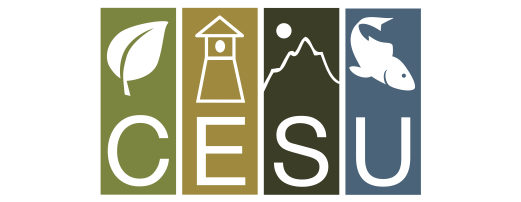Hawai‘i-Pacific Cooperative Ecosystems Studies Unit
The University of Hawai‘i (UH) plays an important role in Hawai‘i in the care of its natural resources and the communities that rely on them. Through partnerships with federal, state, private and non-profit organizations, UH’s collective resources bring world-class expertise and facilities to these collaborative efforts, providing rich and meaningful training opportunities for students.
Many of these collaborations involving UH are a result of its participation in the Hawai‘i-Pacific Cooperative Ecosystems Studies Unit (HPI-CESU), a partnership program between 10 U.S. federal agencies and 14 non-federal members. HPI-CESU is one of 17 Cooperative Ecosystems Studies Units (CESU) across the United States that were developed to foster federal-non-federal partnerships to steward cultural and natural resources on public lands. As such, the HPI-CESU serves as the backbone of many successful and important conservation collaborations in the state.
Federal agencies can choose to work with a specific CESU, meaning that only HPI-CESU members are eligible to apply for projects targeting this CESU. Funds are provided to partners via a federal CESU cooperative agreement, which requires significant involvement of both federal and non-federal partners and emphasizes student engagement. The University of Hawai‘i, as a key repository of research expertise and students, serves as the HPI-CESU host organization.
“Membership in the HPI-CESU provides a rich suite of opportunities for UH researchers to work with federal agencies in Hawai‘i and the Pacific on important collaborative research that helps the state and its partners care for the natural and cultural resources in the region,” said HPI-CESU Director Sharon Ziegler-Chong at the University of Hawai‘i at Hilo.
Since October 2019, UH has received over $10 million from different agencies to work on a variety of projects. The Plant Extinction Prevention Program (PEPP), is a Pacific Cooperative Studies Unit (PCSU) project between UH Mānoa’s Department of Botany, the U.S. Department of Interior’s Fish and Wildlife Service and other partners. Another exciting project is a project led by Davianna McGregor, professor of Ethnic Studies at UH Mānoa’s Center for Oral History with the National Park Service. The multi-year project is conducting an oral history project for all Region 12 parks, i.e., those in Hawai‘i and the Pacific Islands, to capture the important stories and history behind these parks. Examples include the history of fencing on Haleakalā, the opelu boat traditions at Pu‘uhonua O Hōnaunau, and the oral histories of internees, POWs and the community at large impacted by the internment camp at the Honouliuli National Historic Site.
The Army Natural Resources Program on O‘ahu (see story), administratively managed by the UH Office of the Vice President for Research and Innovation, is a key partnership made possible through UH’s HPI-CESU membership.

